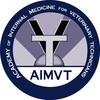In addition to the Core Requirements, you must also complete the following for a Small Animal Internal Medicine credentialing.
Advanced Skills Requirements
Advanced Knowledge Requirements
Case Log Requirements
Case Report Requirements
Advanced Skills Requirements
- Visit the page linked above (button) for a copy of the Instructions you may download.
- There are two options for who may sign your skills list verifying mastery of the fundamental and essential advanced skills:
- Option 1 – If you work 75% or more in SAIM, any DVM or a VTS member of AVTAA, AVTCP, or AVECCTN may sign off on the skills list.
- Option 2 – If you work 55-75% in SAIM, only a VTS or Diplomate in SAIM may sign off on the skills list.
- A link to the advanced skills mastery attestation forms can be found in the application instructions packet
Advanced Knowledge Requirements
- Provide documentary evidence of advanced knowledge of disease states and processes in the selected area of specialization of internal medicine through completion of the Advanced Veterinary Internal Medicine Knowledge Form (included as part of the core application).
- Click here to download Small Animal Knowledge List
Case Log Requirements
- The 2024 Case Logs will be presented as a census, with checkboxes for skills performed and assisted with
- Review the 2024 part 2 application instructions packet for additional information
- NOTE: While there is some overlap between the skills and knowledge used in both small animal internal medicine (SAIM) and emergency and critical care medicine (ECC), these are separate and distinct specialties within veterinary medicine. Veterinary Technicians interested in applying for certification as a Veterinary Technician Specialist (VTS) in SAIM are advised to ensure that all cases selected as part of their application are within the specialty of SAIM and not ECC (e.g. trauma, toxicology) or other specialties .
Case Report Requirements
- See the 2024 Application Information for specific Case Report requirements, or click the button above.
- All Case Reports must follow the Case Report Requirements Checklist.
- AIMVT has provided examples of previous Case Reports HERE. These examples are not 100% perfect but represent superior work by previous applicants.
- If you wish to include laboratory reports with your case report, please add them as appendices to your Case Report. These lab reports will not count towards your total page count. You may submit laboratory reports in whatever format you prefer; you may download our lab form here.
- A weighted scale will be used to score your case report, for more information please follow this link.
Consensus statement regarding Credentialing Committee review of Case Logs:
Patients who are ultimately diagnosed with a disease condition outside of the applicant’s specialty will be accepted IF the patient presented to the applicant’s service or facility with reported symptoms and/or clinical signs of a disease process within the applicant’s specialty, AND the applicant performed advanced skills within their specialty even if the final diagnosis is not in the applicant’s specialty. Patients who present with no reported symptoms and/or clinical signs of a disease process within the applicant’s specialty will NOT be allowed.
For example:
Cases outside of the applicant’s specialty may comprise no more than 10% of the submitted Logs. Cases with a final diagnosis outside of the applicant’s specialty may NOT be used for any Case Report.
Patients who are ultimately diagnosed with a disease condition outside of the applicant’s specialty will be accepted IF the patient presented to the applicant’s service or facility with reported symptoms and/or clinical signs of a disease process within the applicant’s specialty, AND the applicant performed advanced skills within their specialty even if the final diagnosis is not in the applicant’s specialty. Patients who present with no reported symptoms and/or clinical signs of a disease process within the applicant’s specialty will NOT be allowed.
For example:
- A patient presents to the small animal IM (SAIM) service to diagnose a gastrointestinal (GI) disorder that is ultimately diagnosed with GI lymphoma (oncology).
- A patient presents to the neurology service to investigate a seizure disorder; the final diagnosis is syncope (cardiology).
- A patient presents to the cardiology service in respiratory distress presumed to be due to congestive heart failure (CHF), with a final diagnosis of feline asthma (SAIM).
- A patient presents to the oncology service for enlarged lymph nodes which are ultimately deemed to be secondary to an infectious process (SAIM).
Cases outside of the applicant’s specialty may comprise no more than 10% of the submitted Logs. Cases with a final diagnosis outside of the applicant’s specialty may NOT be used for any Case Report.
